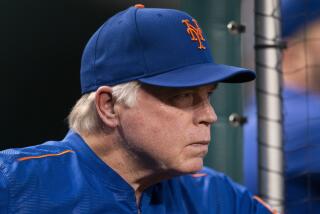Stellick Faces Uphill Battle With Toronto
- Share via
TORONTO — The youngest general manager in major-league sports is wary of rivals looking for a steal of a deal.
When 31-year-old Gord Stellick took over as general manager of the National Hockey League’s Toronto Maple Leafs in April, he was contacted two or three times by other GMs looking to pick up promising talent like Al Iafrate or Ed Olczyk at bargain basement prices.
“They offered some fourth liner, a sixth-round pick two years ago from college and their second leading scorer on their minor league team, and tell me ‘they should step in and help your club right away,”’ Stellick said.
The Toronto Maple Leafs have needed help “right away” for quite a while. Last year, Toronto became the worst team ever to make the NHL playoffs, with just 52 points in 80 games. Only Minnesota’s superior ineptitude allowed the Leafs into post-season activity. Toronto has been under .500 for the last nine seasons, and have the worst composite record in the league over the last five seasons.
The task of turning things around has been handed to Stellick. Critics have suggested that Toronto’s controversial 85-year old owner, Harold Ballard, selected the only candidate who would live long enough to see the Leafs turn things around.
“I’m representing all the 31-year-olds who want to get ahead,” Stellick said.
He may be young, but he isn’t inexperienced. Joining the Leafs at age 17, Stellick started as a press-box runner, worked part-time while attending the University of Toronto and then full-time, moving through the organization until he became the assistant to GM Gerry McNamara three years ago.
With the Leafs floundering last February, Ballard found McNamara and coach John Brophy feuding, and Brophy feuding with some players. Ballard axed McNamara and filled the vacancy after the season ended with Stellick.
“I thought I had an outside chance. I wasn’t really lobbying,” Stellick said. “I was quite comfortable hoping to serve as the new guy’s assistant and look after Newmarket (Toronto’s minor league affiliate).”
Stellick is blunt in appraising the team’s performance.
“We’ve got a lot of players who underachieved last year. They’re capable of more, but for one reason or another, they didn’t produce last year,” Stellick said.
But that assessment is not meant as a criticism of Brophy.
“Players, coaching staff and management ... we all underachieved, leave it at that. We’re not going to focus on one or two players. If you’re going to emphasize the team concept of winning, you’ve got to have a team concept of losing too,” he said.
As the employee responsible for supplying the players, Stellick has added free-agents and fringe players, while waiting for draft choices to develop, rather than making a big deal.
“Let’s get off this package deal, (Rangers General Manager) Phil Esposito mentality, not that there’s anything wrong with that method,” Stellick said. “What’s the point in trading two guys on your third line, you have to change your core. Our big weaknesses are consistency and depth. There’s going to be a point where we lose three games in a row this year. We don’t want to let it snowball, keep losing and then you’re buried by January.”
The 1988-89 Leafs will start the season with a similar roster to last year’s squad. To improve, you must identify your weaknesses. Stellick finds no shortage.
“We feel we’ve got to improve our overall defense,” he said. “Center is a weakness because that’s the way it was last year, but it could be a strength. Right wing is our perceived and probably real weakness. Left wing last year was a strength, this year we view it as adequate.”
Coach John Brophy’s job could be on the line if Toronto starts slowly. It is one sign of coaching instability in the NHL that entering his third season, Brophy is the third most senior coach in the league. That’s even more remarkable in light of Toronto’s lack of success. Stellick has been irked by reports that he does not have the power to fire the coach.
“When I took the job, it was known Harold (Ballard) wanted John Brophy to coach. That was fact. In any big decision, the owner has veto power. If I presented him something in the best interest in helping the hockey club, he’d back me up. I’m not the only general manager in the league that answers to ownership,” Stellick said.
More to Read
Go beyond the scoreboard
Get the latest on L.A.'s teams in the daily Sports Report newsletter.
You may occasionally receive promotional content from the Los Angeles Times.






